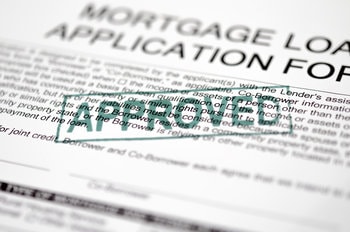 Applying for a mortgage loan is never an easy task. And it's even harder to land a mortgage for self-employed borrowers.
Applying for a mortgage loan is never an easy task. And it's even harder to land a mortgage for self-employed borrowers.
The good news? This doesn't mean that qualifying for a mortgage loan when you are self-employed is impossible. You'll just have to provide more paperwork to prove to lenders that your income is high and steady enough to cover your monthly mortgage payments. You might also have to look at alternative loan programs designed for borrowers with non-traditional income streams.
How long must you be self-employed to qualify?
It depends. The most common requirement is 24 months. But that assumes that you turn a profit during the first 24 months your business is open. Lenders average those 24 months of income, so you may need more time to establish that you earn enough to support a mortgage.
In some cases, you only need 12 months of self-employment. For a Fannie Mae (conforming) mortgage, for example, you can qualify with 12 months of self-employment if you have previous experience in your field. Your self-employment income must be at least as much as you earned in that field before becoming self-employed.
The self-employed mortgage challenge
Kevin Leibowitz, owner of Brooklyn-based Grayton Mortgage, said that some self-employed borrowers suffer from what he calls "having your cake and eating it, too."
What does this mean? Come tax time, self-employed entrepreneurs claim as many businesses expenses as they can. This reduces the amount of income taxes they must pay. But it also reduces what mortgage lenders consider income. And this can make it difficult for self-employed borrowers to qualify for a larger mortgage.
"The majority of self-employed individuals write off too much income to qualify for a traditional mortgage," says Scott Hastings, a mortgage lender with Arbor Financial Group in Mooresville, North Carolina. "In my initial conversations, many clients tell me the gross sales they had the prior year. What they don't realize is that for mortgage purposes, their income is determined by their net profit, the amount they actually pay taxes on."
"What I tell my borrowers is that if it's not on your taxes, then it doesn't exist," Leibowitz said.
Related: How to Refinance When You're Self-Employed
How mortgage underwriters calculate self-employment income
Underwriters don't just go to the bottom line on your tax return for your business income. To come up with "qualifying" income for self-employed borrowers, they start with the taxable income and add back deductions like depreciation and depletion, which are "paper"expenses you don't write a check for.
They might add back extraordinary expenses that won't recur. And they could subtract "extraordinary" or "windfall" income. Unless income is stable and ongoing, it won't count on your mortgage application.
Another important consideration is income consistency. If your most recent tax returns show less income than the previous year's, lenders may not just average the two years. They may only use the lower number. Or they may even discount that. Lenders are very wary of a business that appears to be failing and not thriving.
You may be able to get a more generous outcome by supplying extra documents, as shown below.
Documents required for self employed mortgage
If you want a self-employed mortgage, you need some documentation. Here's what's required for a typical self-employed mortgage:
- Last two years of tax returns for you and your business, including all schedules and supporting worksheets
- Year-to-date profit and loss statement (P and L)
- Current balance sheet
- Letter from your accountant stating that you are still in business (or a copy of your current business license and corporate filings with your Secretary of State's office)
- Bank statements (two months for your personal and business accounts, all pages)
New guidelines may allow you to qualify with just one year of tax returns. If you are a very strong candidate, you may not need two years of documentation.
Related: 5 Common Mortgage Mistakes to Avoid
Additional documents you may need
Sometimes the bare minimum of documentation doesn't answer all of your lender's questions. In that case, you may need:
- Forms 1099 from your clients showing what they paid you
- Additional years of tax returns
- Proof that you have access to self-employment income and assets
- A letter from your CPA explaining losses or income irregularities
Lenders want proof that your business income is reliable, consistent and ongoing. They are not comfortable with income that fluctuates wildly from year to year. If yours does (and that is normal in some industries), you need to explain it and reassure the lender.
Edith Muthoni, chief editor of Learnbonds.com, said that lenders look for consistency when studying the financial records of self-employed borrowers. "No single mortgage company will want to give a mortgage to what seems like an automatic defaulter," she said. "You must show some consistency in the income that you make."
It might help, too, to provide more tax returns. It's common, for example, for home developers to show huge losses when they buy land, prepare it for development and start building houses. And the next year, they begin selling homes and show a profit. The following year, it might be all profit. So providing three-to-five years of tax returns would demonstrate this.
More documents!
Lenders also look at your assets, to determine that the down payment comes from an acceptable source. Business assets may be off limits because you need them to continue earning.
And underwriters want to make sure that you do not have undisclosed loans. So if your statement contains an unusually large deposit, you may have to document the source of that money.
Some lenders do self-employed mortgages better
You might also need to shop around for a mortgage. Some lenders are more comfortable working with self-employed borrowers than are others, Fitzgerald said. Don't give up if you hear a "no" from the first lender you meet.
"Too many people talk to one lender and give up, thinking that if one lender says 'no,' they will all say 'no,'" Fitzgerald said. "This is not the case."
As Fitzgerald says, some banks and credit unions have special programs for self-employed borrowers. He recommends that such borrowers start with their local credit unions, which often work with non-traditional borrowers.
Related: Asset Depletion Mortgages
Bank-statement loans
Bank statement loans are designed to help self-employed applicants show their true cash flow when tax returns do not.
With bank statement loans, mortgage lenders determine your business income by examining your bank statements. Bank statements show incoming and outgoing cash for the business.
There is no standard way to look at income with bank statement loans. Some lenders require only 12 months of statements. Most want at least 24 months and some require 60 months. And there is no standard calculation for income. But most lenders average the deposits and allocate a specific percentage as income. That's because the business requires money to keep operating -- it can't all be used for mortgage payments.
Scott Hastings says that many of his clients rely on bank-statement loans when looking for mortgage dollars. His company considers 50% of bank deposits for qualifying income.
Related: The New Non-Prime Mortgage (Are These Crazy Programs Right for You?)
Side gigs
Not everyone supports themselves with their self-employment. And in the past, side gigs or startups that showed losses tripped up mortgage applicants. Because lenders subtracted the losses from the borrower's regular income when underwriting mortgage applications.
Today, Fannie Mae says that borrowers qualifying for a mortgage with "regular" jobs can leave out the side gig. That's also true if your main income is from retirement accounts, social security, pensions or dividends.
Self-employed co-borrowers
Similarly, if you can qualify for a loan with your own income, and your co-borrower is self-employed, you don't have to include the business on your application. That's great if the business shows a tax loss or if you just don't want to deal with the paperwork.
Advance planning
If you're self-employed and concerned about your income, plan in advance. Contact a mortgage professional now and find out how your taxable business income would look to a lender, and how much you'd be able to borrow.
If necessary, you can change the way you write off your business expenses, and the amount of taxable income you show. You're also allowed to amend previous tax returns to show higher income from the past.
Related: Fannie Mae 1084, Business Cash Flow Analysis and Instructions
Note that some deductions, such as depreciation, won't hurt you. Underwriters add these deductions back into your taxable income.
Involve your accountant and see how you can prepare for a mortgage application today.
Mortgage rates for self-employed borrowers
For traditional mortgage programs, there is no surcharge for being self-employed. They are more work for lenders, but lenders don't pass on the extra underwriting cost to you.
If you require a special program like a bank statement loan, the interest rate will likely be higher. You may also have to put more money down for a home purchase.
Whichever loan you choose, compare several offers before committing to a lender. That's the best way to make sure you're getting a great rate on your mortgage.



